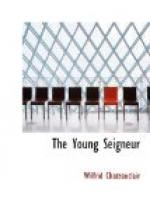They were the Jalberts, daughters of the innkeeper, who himself with two young politicians from Montreal were impressing on a habitant: “If you don’t vote for Libergent, you can’t go to heaven;” Jalbert being an adherent of the Blues in the hope of “running” Dormilliere, if they succeeded, for his license had been taken away by the new movement. The bailiff, a wolfish-looking creature, who was always to be had for drink, also sat there trailing his vast loose moustache over a table. When Grandmoulin entered, a little crowd, like the tail of a comet, followed him into the room. As he passed through he said no word, but drew his cloak about him and moved forward sphinx-like to the bar of the court, where he sat down and commenced to converse with Libergent.
Chrysler mounted the stairs with his entertainer and came upon an entirely different scene. De Bleury’s spacious attic was appropriated to the rough and ready convenience of himself alone, and there was something quizzical about its expanses of brown dimnesses and darknesses, the cobwebby light that struggled in through the one high dormer window, the closet-like partition in the middle with a ticket-selling orifice, and the three or four rough chairs, which, with table, newspaper, and a basket of bottles, formed the furniture of this apartment. What work was done here, and how any one could choose such a spot to do work in were questions asked you mysteriously by every object about. As soon as he had waved Chrysler to one of the chairs and sank back upon another into a shadow, he stretched out his hand and pulled the basket of bottles towards him.
“Now, sir, the question of fortune to every good man as he enters the world: ‘What will you have.’ I don’t believe in fate: I believe in fortune: good things for everybody; let him choose. It’s the man who won’t accept good mouthfuls who is miserable. My Lord, what will you have?”
“I never take anything, thank you!”
“Eh, Mon Dieu! You wouldn’t have me drink alone! You grieve my soul, Chrysler! Bois, done, my dear friend, we will be merry together. In this cursed country, among these oxen of the farms, we don’t often meet a civilized friend.” In saying this, he was dexterously pulling the cork from a bottle of champagne, which his right hand now poured into two wine glasses, as skilfully as his left had whisked them out of a corner of the basket.
“Drink quickly,—Eh bien, you do not wish to? Your health then!—May you long survive your principles, and experience a blessed death of gout!”
He quaffed off the glass and poured out another, laughing and chatting on with such bounding, irresistible spirits that his guest caught a kind of sympathetic infection. Glass after glass interminable disappeared down his throat in a kind of intermittent cascade. The Ontarian laughed more than he had done for many a year.
“But, De Bleury,” he got breath to say, “what is your important capacity here, that they give you such sumptuous quarters?”




